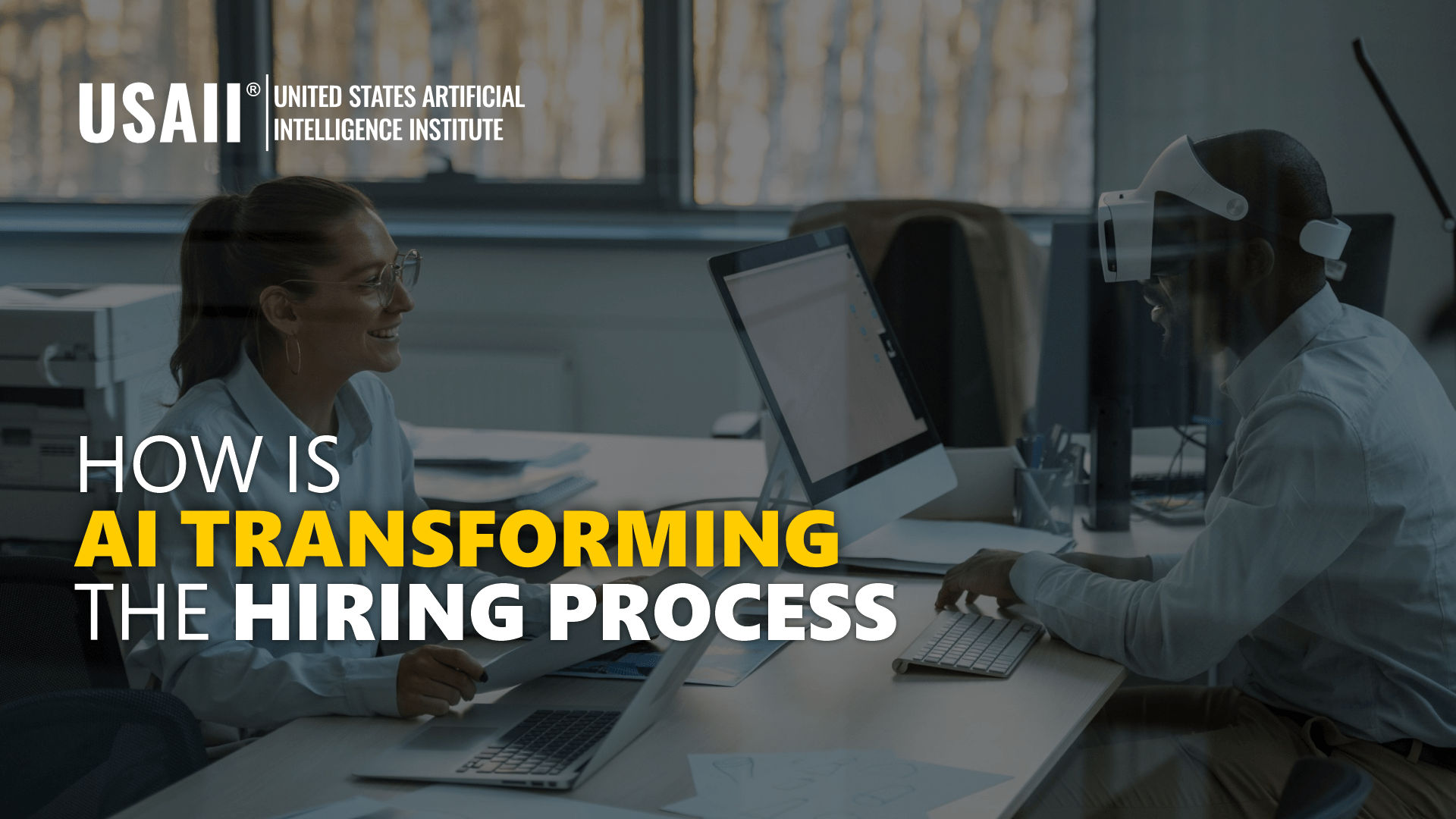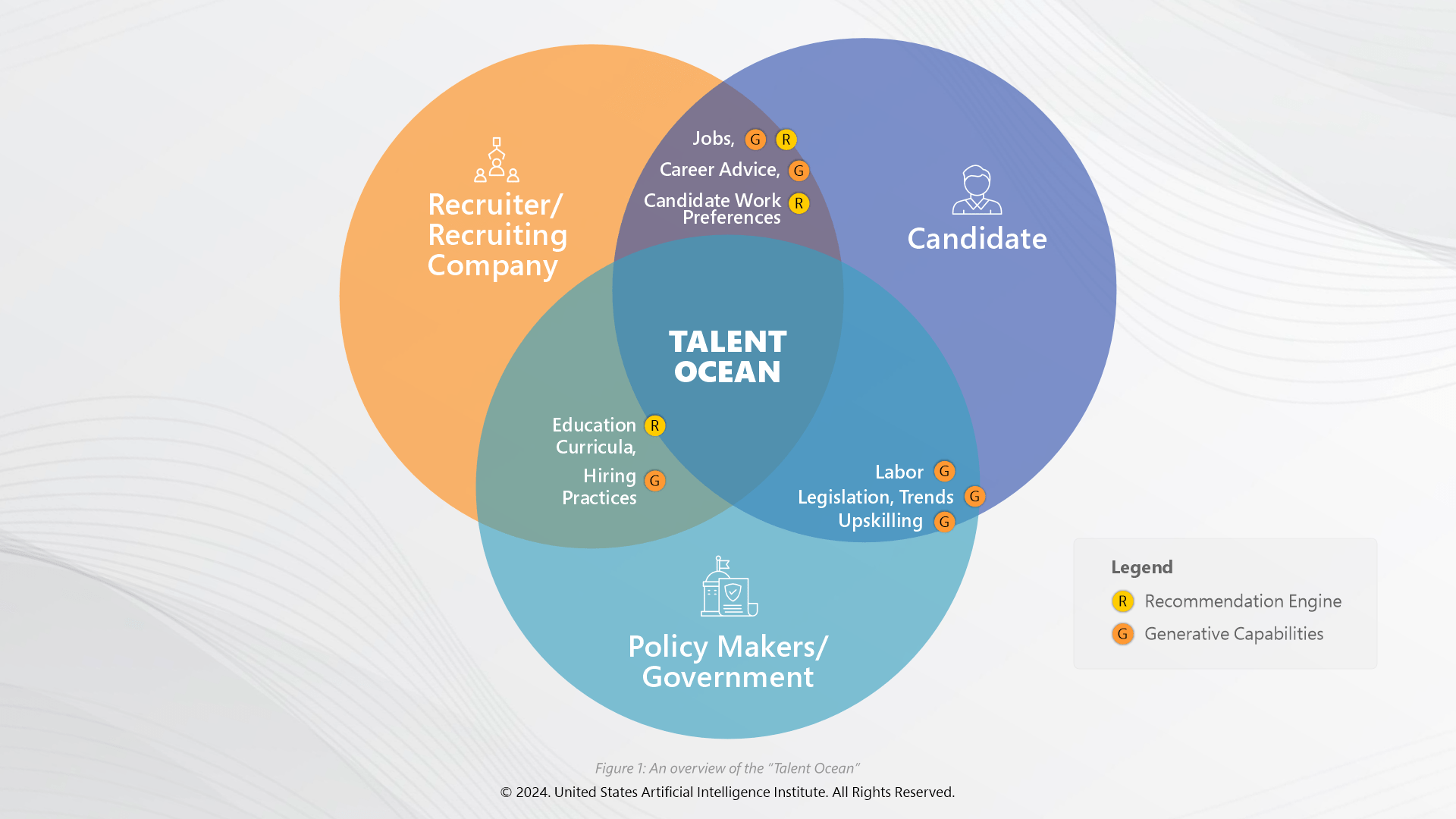
Executive Summary
Artificial Intelligence (AI) stands to disrupt many industries, including the most human of them, Human Resources. This article discusses the concept of “The Talent Ocean”: an AI-powered,
massive talent pool where applicants, companies, and regulators meet. Using a proper AI strategy and the right execution, The Talent Ocean could revolutionize hiring practices, enhancing efficiency and fairness for both recruiters and candidates. It would greatly augment recruiters’ capabilities, reduce hiring bias, and lead to more effective hiring processes and better alignment between candidates and job roles. And with government involvement, this could also alter the way that society organically adapts to changes in the job market. Challenges exist, mostly around data
security and ethics, but they can be mitigated and managed.
The Problem
Historically, hiring has involved individuals manually screening and selecting candidates, a process that can be straightforward in small-scale scenarios but becomes increasingly complex as the size and scope of the organization grow. Sometimes, this task can be simple when the pool of suitable candidates is small enough to interview and make an offer.
On the other hand, looking at a situation where a given position draws a much larger pool of applicants, many issues arise:
The Solution: The Talent Ocean
The solution lies in developing a comprehensive human capital marketplace, known as “The Talent Ocean”, which provides a deeper, more holistic view of candidates beyond their resumes.
Candidates would enroll in this marketplace, providing detailed profiles that include their work experiences, work, and team preferences, and taking personality tests to facilitate the creation of a diverse, high-performing team.
This interaction would be ongoing, with candidates periodically updating their profiles and receiving career guidance based on market trends. The one-time entry of information is a much better proposition than tailoring their resume and cover letter for each job application as it is done now or answering the same questions repeatedly.
HR professionals could then access this talent pool and select candidates with detailed factors such as aptitude for learning in each area, suitability for a given role (whether published or not), and the candidate’s personality would mesh with the team. Since candidates’ experience is something that is mentioned in advance, a candidate cannot “reinvent themselves” from job posting to job posting on their resume. This would also be a great way to create a passive candidate pipeline. This could also allow for much higher salary transparency based on job responsibilities, rather than title; since this type of analysis is well-suited for AI.
Finally, policymakers could see where there are skill or job shortages, which could lead to policies and programs being implemented to benefit workers, companies, and the government.

To be clear, The Talent Ocean is not the first usage of AI; There are plenty of examples of companies that already effectively use AI. For example, IBM uses its AI-powered platform in the hiring process. Unilever gives its candidates a video interview that asks questions designed to figure out which employees are most likely to be high-performing employees. What sets The Talent
Ocean Apart is in its holistic approach focusing on a 360 view of the candidate, rather than on a resume.
Incorporating AI
The Talent Ocean is a realistic goal given that the non-AI parts already exist to some extent, and the AI parts to be added are available either in generative capabilities that already exist or are logical extensions to existing AI solutions.
Jobs: Posting and Search
AI can streamline job postings by generating them based on existing templates, tailored to specific requirements. AI is already enhancing job searches by providing personalized recommendations candidates based on a resume in tools like Eightfold.ai, but The Talent Ocean would leap forward by basing its recommendations on an extensive candidate profile.
Career Advice
AI could offer proactive career advice, suggesting skill development paths and new opportunities based on evolving industry trends. For example, for a coding language being used less and less, the AI might recommend you learn the language that is slowly replacing it. Generative AI already can provide this in general; and can tailor it based on the candidate’s profile.
Labor Legislation
AI can assist policymakers by analyzing labor market data to inform legislation on remote work standards, benefits, and support for displaced workers. This leverages the ability of AI to summarize large amounts of information.
Trends
AI could summarize hiring data and inform on trends seen in candidate hiring.
Upskilling
With labor markets in constant flux, currently, policymakers only see and act on a situation when the situation is already dire. AI could summarize data on what skills might be a good idea for upskilling to help keep the labor force constantly employed (and economically productive).
Education Curricula
AI could make recommendations to change school curricula at various levels to address issues seen in the workplace, both in soft and hard skills.
Hiring Practices
This is a place where AI could provide a report that tells policymakers to what degree employers' hiring practices align with legislation, allowing for small corrective actions early rather than large ones. Since hiring practices can reveal bias in AI, an independent AI process could hire audit bias in another AI.
Data Security, Confidentiality and Ethics
The Talent Ocean contains many different sources of data, all of which require a different approach to securing the data based on whether the data is public or highly confidential. Moreover, a policy must be published which makes it clear how the data shall and shall not be used.
Other Challenges
In addition to navigating the plethora of issues raised when dealing with personal information at a large scale, this project has a few other challenges, all of which are minor.
Employer Buy-in and Talent Pool Website Changes Required
Many companies have their own Careers websites, and for Talent Ocean to be a success, companies would have to integrate their TA ERP (e.g. Workday, Salesforce, Taleo, Oracle, etc.) with The Talent Ocean.
Candidate Upfront Investment
For The Talent Ocean to work, candidates will have to enter a lot of information which takes time, they will not do so unless there is a good chance it will benefit them. This can be mitigated in a few ways:
Role of the Government in The Talent Ocean
As explained earlier, to truly change how we work in the longer term, there must be a feedback loop from and to the government to form policies and programs that benefit all parties as well as regulate companies.
Conclusion
AI's transformative potential in business is immense, particularly in revolutionizing hiring practices. While what has been outlined here has the potential to revolutionize the way we hire and work, its success depends greatly on strategic planning, the gathering of quality data, and a mindset that there must be ongoing work to improve the AI components. As implied throughout this article, businesses must stay abreast of AI advancements to capitalize on opportunities and mitigate
potential risks, ensuring continuous improvement and competitive advantage. Data security, confidentiality and ethical issues must be constantly monitored to ensure all parties are complying with the agreed-upon policies.
Follow us: